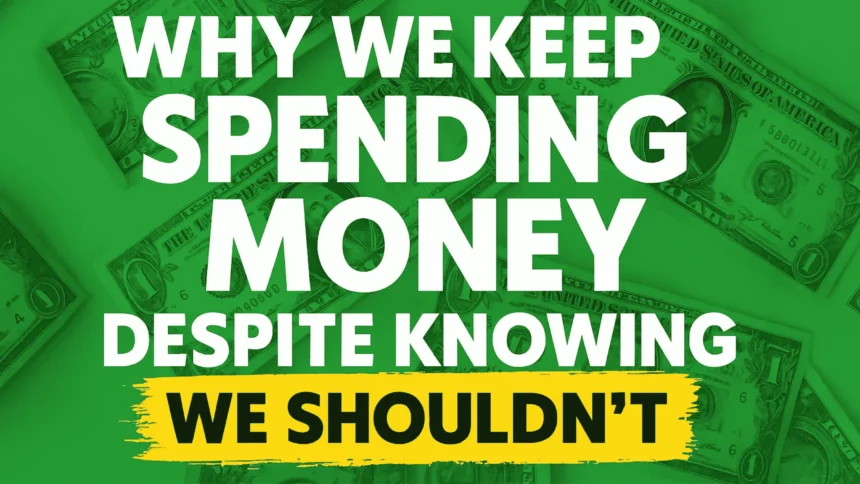Spending money feels like second nature in America. You work hard, you earn, you spend—that’s just how it goes. We’ve somehow made it part of the culture, like baseball and backyard BBQs. And while there’s nothing wrong with enjoying the fruits of your labor, let’s be honest: we’re not exactly saving champions. With the average saving rate hovering around 5%, it’s clear we prefer instant gratification over long-term gain.
I’ll be the first to admit, I love a good splurge now and then. But the trouble starts when that occasional treat turns into a habit. Before you know it, you’re living paycheck to paycheck, stressed out, and wondering how you got here. I’ve been there. And today, I want to talk about why it’s so hard to stop spending money, even when every part of our brain tells us it’s not the smart move.
A Scoop of Shame at $14
A few weeks ago, after dropping the kids off at parkour, my wife and I wandered down to Haight-Ashbury for some ice cream. We stopped at Ben & Jerry’s—a place packed with nostalgia for me. I used to hit it up back in the 90s when Jerry Garcia was still alive. The vibe was just different back then.
Anyway, I asked the clerk if they had any exclusive flavors. She offered a sorbet, but I was craving something creamy. That’s when I saw the prices. One scoop, $8.75. Two scoops? $13. Waffle cone? Toss another $3.75 on top.
I hesitated. My brain screamed, “This is crazy! A whole pint costs five bucks at the store!” But instead of backing out, I caved. I didn’t want to look cheap in front of my wife—even though she’d probably understand. So I paid $14 for one scoop in a waffle cone.
We ate it—triple caramel chunk, pretty good stuff—but I felt ridiculous. Walking back, I blurted out, “Never again. That was dumb.”
And here’s the thing: it wasn’t about the ice cream. It was about feeling judged. I ignored my better judgment to keep up appearances.
When Saving Feels Like Losing
Let’s rewind a bit. For months, my wife and I talked about renting a house in Hawaii for our five-week summer break. Something nice. Something different. But just when we were about to pull the trigger, the stock market took a nosedive. We were down nearly a million. Not easy to digest when both parents are unemployed.
That got me thinking: maybe we should spend the money now instead of watching it vanish in the market. She agreed. YOLO, right?
I started hunting for rentals. The one we liked the most came out to $24,000 a month—after taxes, fees, utilities. That’s a lot. Especially when my parents offered to let us stay at their place… for free. Privacy would be an issue, sure. And yeah, it’s hard on my mom to host six people. But $24,000 invested today could double in 10-12 years. That’s future college tuition or a down payment for the kids.
In the end, I passed on the rental. My wife wasn’t thrilled, and I get it. Living with in-laws isn’t anyone’s dream. She plans all our trips, handles logistics, and this indecision was frustrating her.
Still, I just couldn’t say yes. It didn’t feel right—even though it technically fit our vacation budget. So no pool, no private house, just more guilt that I’d let her down.
Why Is Celebrating So Hard?
Fast forward a bit. After weeks of grinding—painting, fixing, staging—we sold our old house and made a good profit. That alone felt like a victory.
I used 70% of the proceeds to buy into the dip. At first, it hurt. Markets dipped even more and the losses piled up. Eventually though, the S&P bounced back. We recovered and I locked in gains on half. Not bad.
On top of that, my book made the USA TODAY bestseller list. I spent over two months doing press, writing guest articles, giving interviews. It was exhausting, but the payoff was real.
If there was ever a time to celebrate, this was it. So I floated the vacation rental idea again. Felt like we’d earned it.
But every search left me feeling more anxious. Rentals with pools—what I really wanted—were $50,000 to $85,000 a month. My wife didn’t even care about the pool. All she wanted was a clean space with two bathrooms and a kitchen.
The thought of shelling out that kind of cash for one month made me queasy. I haven’t rented since 2002. Emotionally, it just didn’t sit right.
So I asked my dad again. “Stay with us,” he said. And once more, I listened. We’d save $24,000 and could spend that on food and fun instead. That’s $800 a day to enjoy Hawaii. Sounded great on paper, but I could tell my wife wasn’t as excited.
Emotional Spending in Disguise
Which brings us back to the overpriced ice cream. That $14 cone wasn’t just dessert. It was an emotional patch job. I felt like I needed to make it up to her somehow—for not booking the fancy rental, for choosing frugality again. Saying yes to that scoop was my way of feeling like I gave something, even if it was small.
But it didn’t really help. I still felt like I failed her.
Growing up in a middle-class home with penny-pinching parents taught me the value of money. We didn’t waste it. That mindset stuck with me, and now, decades later, it’s still hard to shake. I’ve spent my whole adult life building wealth, not spending it.
And here’s the kicker: at least 70% of the joy of being in Hawaii is just… being there. So why does it still feel like I’m not doing enough?
The Real Reason We Overspend
This whole experience taught me something that I think applies to a lot of people—we often spend money not because we want to, but because we’re afraid of how we’ll be seen if we don’t.
That fear of being judged runs deep. Even after 26 years with my wife, I didn’t want to look cheap. I wanted to be the fun, generous husband who treats his family. Not the guy who backs out over a cone of ice cream.
But spending money should reflect your values, not your insecurities. We talk a lot about financial literacy, budgeting, and saving money. But not enough about emotional spending—the kind we do to look good or avoid awkward conversations. That’s the kind that traps us.
We’re not spending for joy. We’re spending to protect our image.
A Simple Fix (Well, Sort Of)
If you find yourself reaching for your wallet just to keep up appearances, try this:
- Stop and check if the expense actually matches your goals
- Ask yourself, “Am I buying this for me or for how I want to be seen?”
- Talk to your partner. Seriously. Being aligned on money matters can save a lot of future resentment
I ended up suggesting a compromise. We could stay weekends at my aunt’s beach house on the other side of the island—if she’s okay with it. Still waiting on her response, though. She’s off traveling.
Another option? A night or two at a beachfront resort. Maybe just Saturday, maybe Friday too if we stretch. Is it worth it with summer school pickup on Friday at 3:30? I don’t know. Maybe I’m being too frugal again. But at least I’m trying to meet in the middle. Progress, right?
So Why Do We Keep Spending?
Because we’re human. Because sometimes it’s easier to say yes than to risk disappointing someone. Because we want to feel successful.
But it’s okay to say no. It’s okay to spend with purpose. And it’s definitely okay to want both freedom and fulfillment in your personal finance journey.
So, next time you’re standing in line, debating whether to splurge on something ridiculous, ask yourself—am I doing this out of joy or just to not feel judged?
That $14 scoop taught me a lesson I’ll carry for a long time. And no, I’m not getting another one. Probably.






